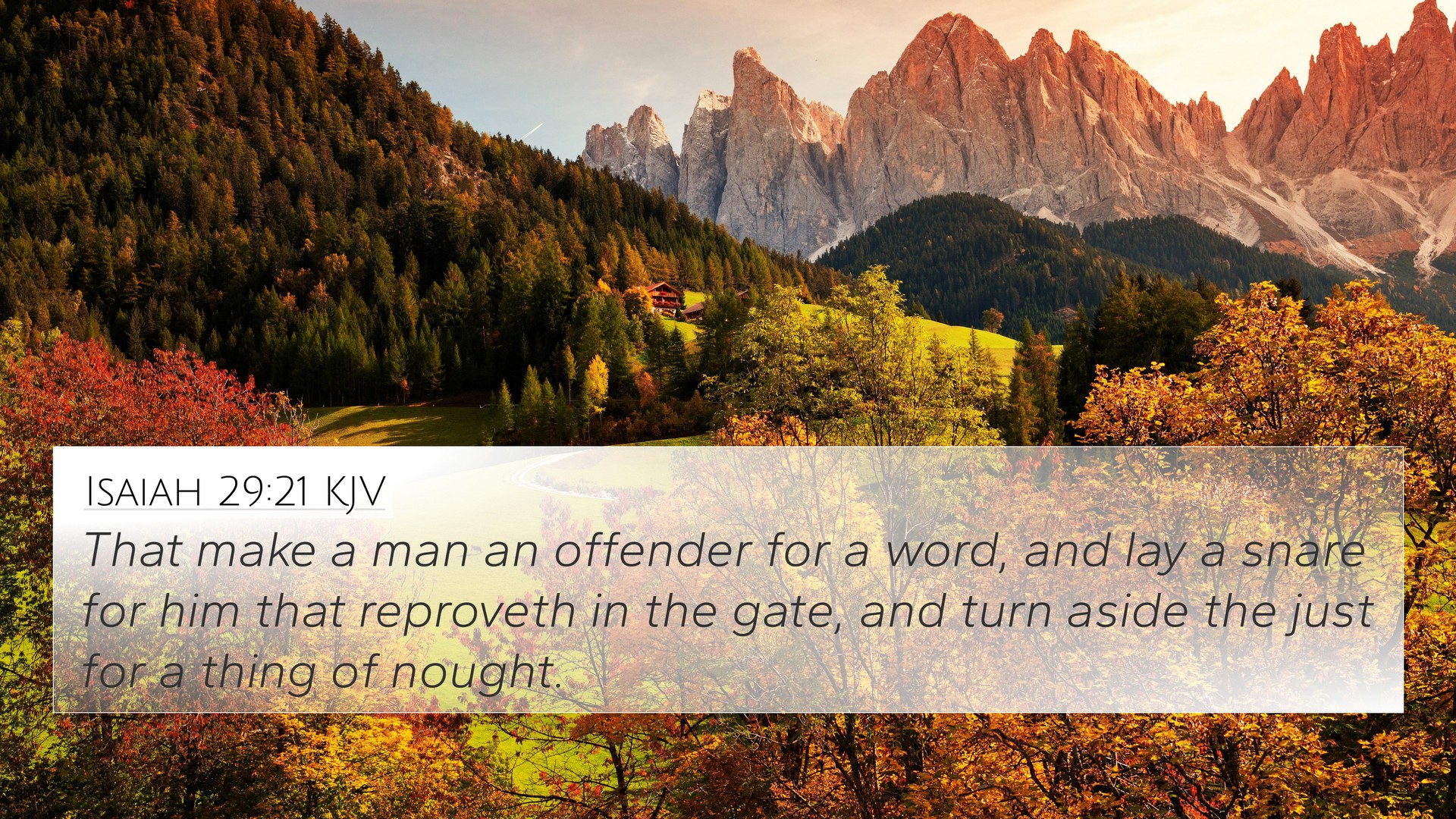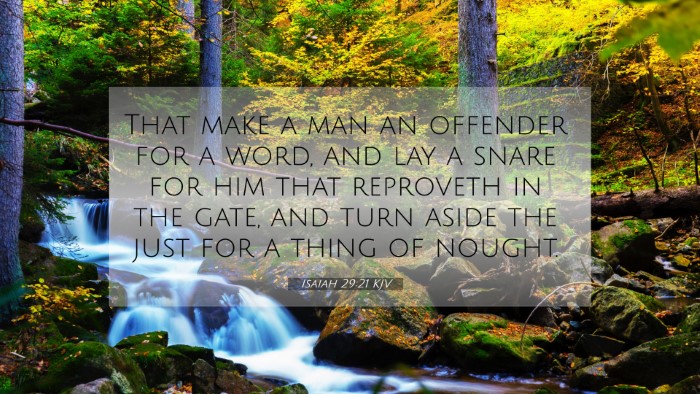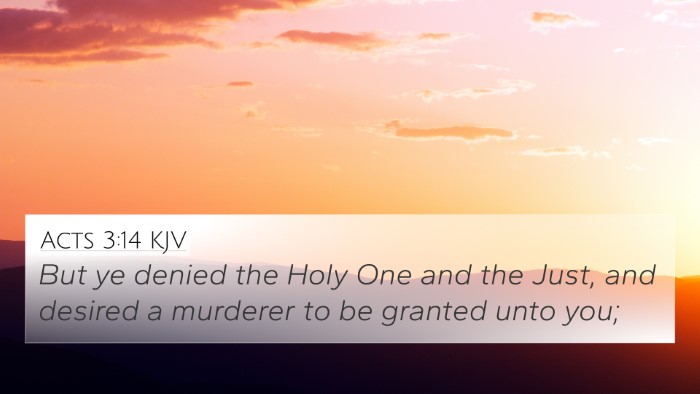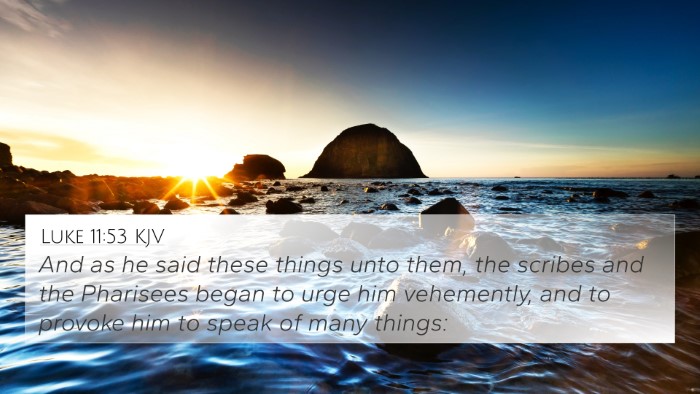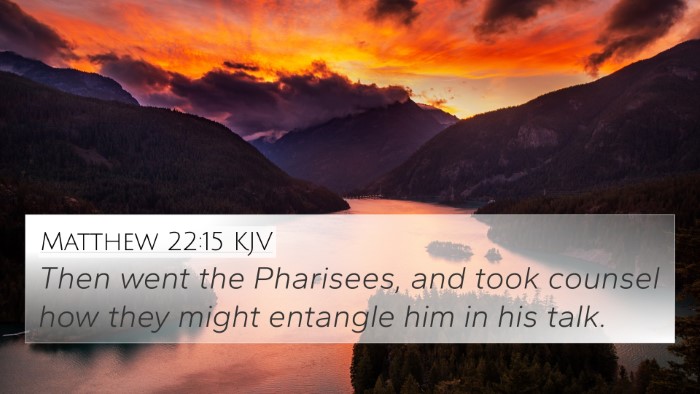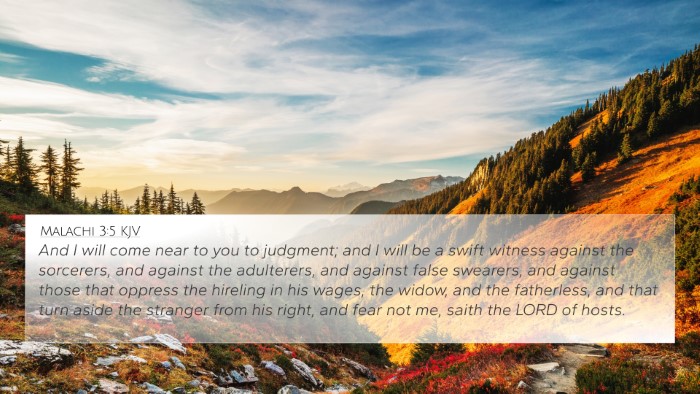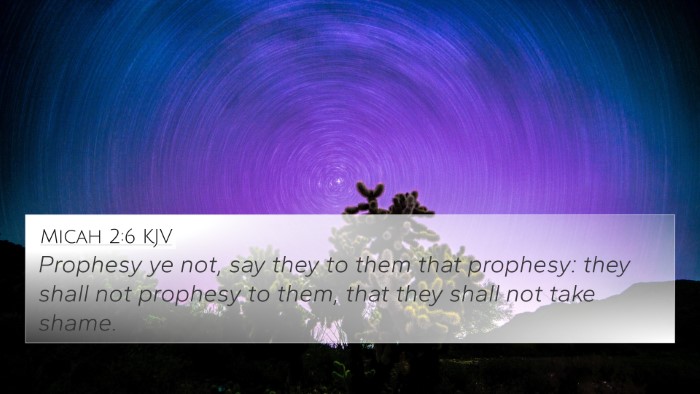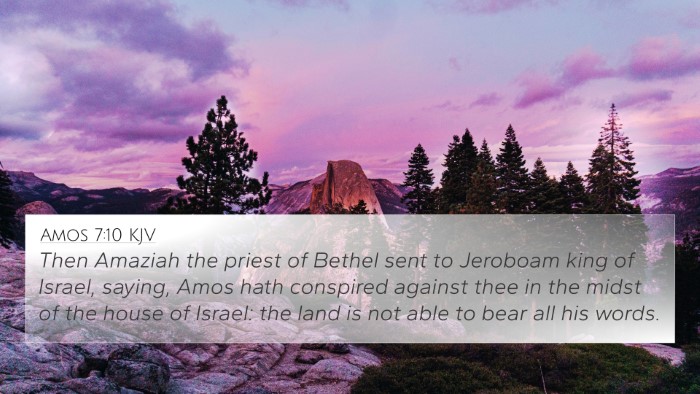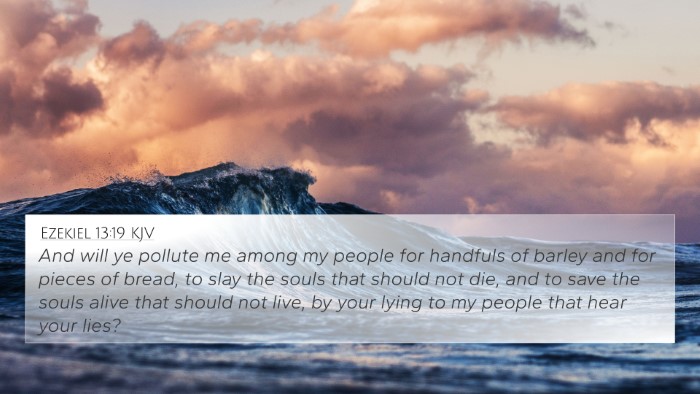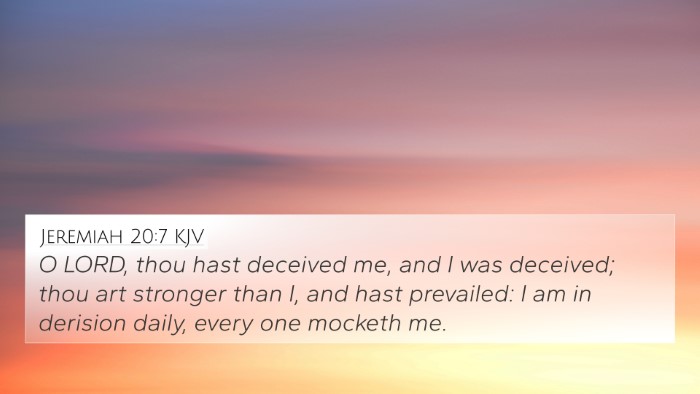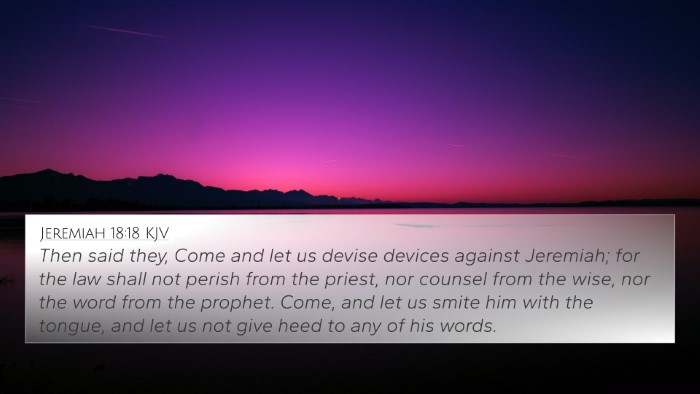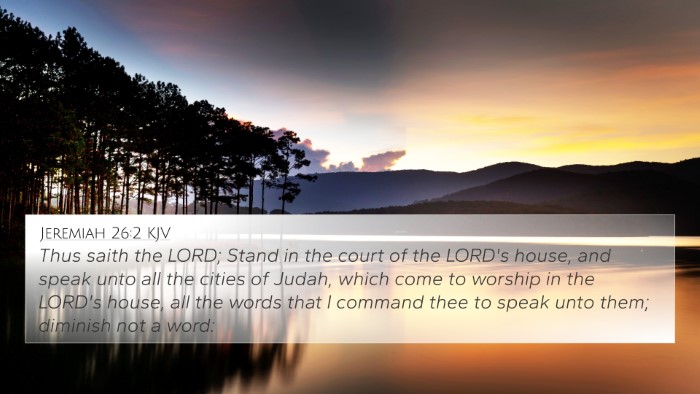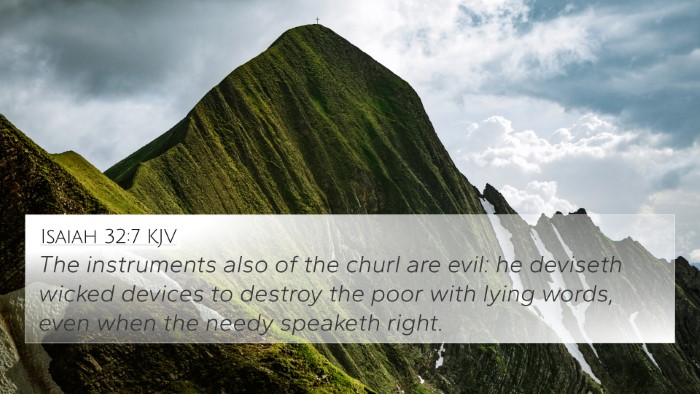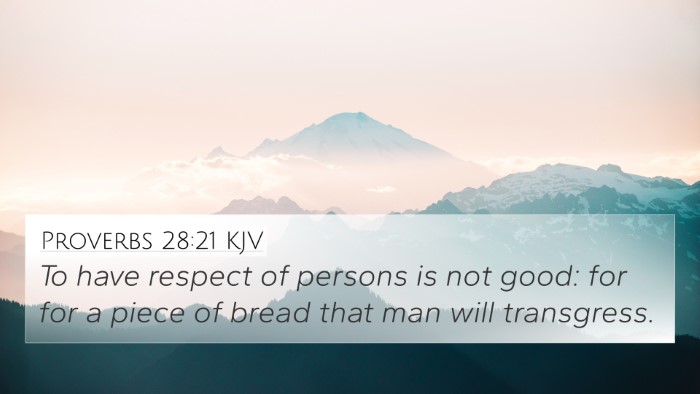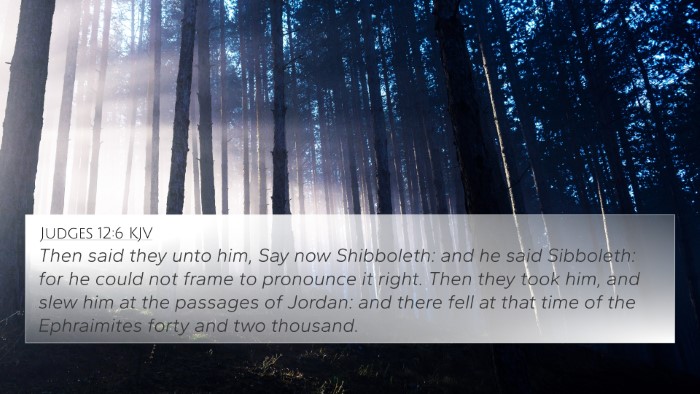Understanding Isaiah 29:21
Isaiah 29:21 reads: "Who make a man an offender for a word, and lay a snare for him that reproveth in the gate, and turn aside the just for a thing of nought." This verse addresses the injustices and oppression faced by those who speak the truth and uphold righteousness. Below is a comprehensive analysis by combining insights from public domain commentaries.
Context and Historical Background
To fully grasp the meaning of Isaiah 29:21, we must understand its historical backdrop. At the time of this prophecy, the people of Judah were facing significant external threats and internal moral decay. The prophetic voice of Isaiah sought to expose the inequities and hypocrisy prevalent within society.
Key Themes and Insights
- Oppression of the Innocent: As Matthew Henry notes, this verse highlights the grave injustice of punishing those who stand for truth and equity. Such individuals often find themselves marginalized and targeted.
- Betrayal of Justice: Albert Barnes emphasizes that the phrase "laid a snare" illustrates the deliberate entrapment of the innocent. Those in power manipulate legal systems to serve their interests, skewing justice.
- The Danger of Words: Adam Clarke points out that the offense taken by the powerful often stems from the spoken truth. The verse draws attention to the peril of speaking out against wrongdoing in corrupt societies.
- Relational Dynamics: The connections made in Isaiah 29:21 reflect a broader theme in scripture, illustrating the struggle between the oppressors and the oppressed throughout the biblical narrative.
Cross-Referencing Biblical Texts
Isaiah 29:21 connects to several other scriptures that shed light on themes of justice and the consequences of oppression. Consider the following cross-references:
- Proverbs 17:15: "He who justifies the wicked, and he who condemns the just, both of them alike are an abomination to the Lord." This highlights the moral failure of those who pervert justice.
- Micah 3:9-10: "Hear this, you heads of the house of Jacob and rulers of the house of Israel, who abhor justice and pervert all equity." A direct commentary on the leaders' failures in maintaining justice.
- Matthew 5:10: "Blessed are those who are persecuted for righteousness' sake, for theirs is the kingdom of heaven." Refers to the plight of the righteous who face opposition.
- Luke 6:22: "Blessed are you when people hate you, and when they exclude you and revile you and spurn your name as evil." This verse reflects the inevitable consequences faced by those who stand for truth.
- Romans 12:19: "Beloved, do not avenge yourselves, but rather give place to wrath; for it is written, 'Vengeance is Mine, I will repay,' says the Lord." Encourages believers to trust God in matters of justice.
- James 4:11: "Do not speak evil of one another, brethren. He who speaks evil of a brother and judges his brother speaks evil of the law and judges the law." A caution against the moral decay of slander and false accusation.
- Psalms 37:28: "For the Lord loves justice, and does not forsake His saints; they are preserved forever." A reminder that God’s justice prevails ultimately.
- Isaiah 10:1-2: "Woe to those who decree unrighteous decrees, who write misfortune, which they have prescribed." This speaks directly to the administering of injustice by those in authority.
- 1 Peter 3:14: "But even if you should suffer for righteousness' sake, you are blessed." Encourages perseverance amidst unjust treatment.
- Job 31:35: "Oh, that I had someone to hear me! I sign my defense—let the Almighty answer me; let my accuser put his indictment in writing." Job’s lament serves as a reflection of the plight of the innocent seeking justice.
Connecting Themes in Isaiah 29:21
The verse illustrates a recurring theme in both the Old and New Testaments regarding the treatment of the righteous. The intentional targeting of those who seek to uphold justice resonates through many Biblical narratives:
- Persecution for Righteousness: As highlighted in Matthew 5:10, the Bible repeatedly emphasizes the rewards awaiting those who are persecuted for living righteously.
- The Role of Prophets: The prophetic tradition, including Isaiah, exposes the moral failures of society and calls for accountability, often facing backlash, as seen in the case of Jeremiah and others.
- The Example of Jesus: In the New Testament, the life of Jesus serves as the ultimate example of one who faced injustice for speaking truth to power.
Practical Applications
For modern-day believers, Isaiah 29:21 prompts reflection on various practical applications in their own lives:
- Upholding Justice: Engage in practices that seek to challenge injustices in society, echoing the sentiment of the verse by speaking out for the voiceless.
- Understanding Consequences: Be prepared for the challenges that may arise when standing for truth, as persecution may be a part of the journey.
- Trusting God: Rely on the assurance that God’s justice will ultimately prevail, even when human systems fail.
Conclusion
Isaiah 29:21 serves as a poignant reminder of the struggles faced by those who speak out against injustice. The combined insights from key biblical commentaries illuminate our understanding of how scripture addresses such themes. Readers are encouraged to explore the cross-references to gain deeper insights into the interconnectedness of biblical texts, leading to a richer understanding of God’s enduring message of justice and righteousness.
Resources for Further Study
For those interested in delving deeper into the study of cross-referencing and thematic connections in scripture, consider utilizing various tools such as:
- Bible concordances
- Cross-reference guides
- Bible reference resources
- Comprehensive Bible cross-reference materials
- Cross-referencing Bible study methods
